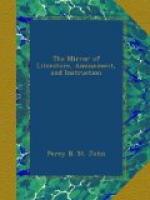Mr. Rhodes, in his interesting Excursions in Derbyshire, notices the following rite at the village of Hathersage: “In this church we observed the traces of a custom that once generally prevailed in various parts of the kingdom, but is now almost totally disused; when unmarried women died, they were usually attended to the grave by the companions of their early years, who, in performing the last sad offices of friendship, accompanied the bier of the deceased with garlands tastefully composed of wreaths of flowers and every emblem of youth, purity, and loveliness, that imagination could suggest. When the body was interred, the garlands were borne into the church, and hung up in a conspicuous station, in memory of the departed. In Hathersage Church there were several of these memorials of early dissolution, but only one of a recent date: the others were covered with dust, and the hand of time had destroyed their freshness.”
In Mr. Tymms’s Family Topographer, vol. ii. we read—“In Stockton Church, Wilts, is a piece of iron frame-work, with some remains of faded ribbon depending from it. It is the last remain of the custom of carrying a garland decorated with ribbons before the corpse of a young unmarried woman, and afterwards suspending it in the church. This instance occurred about thirty years ago.”
* * * * *
THE DRUIDS AND THEIR TIMES.
Translated from the Notes to Oberon, Uber das romantische Epos. By C.M. Wieland.
The people were, during this period, in a state of the most abject vassalage; two classes alone possessing all rank and dignity, and for the most part all the riches of the country. These were the Druids and the warriors. The former composed an order consisting of three classes, Druids, Prophets, and Bards; all of whom were subject to the power of the Arch-Druid. To this order appertained the knowledge of all the sciences which were then understood. The Druids were the expounders of religious mysteries, the framers of laws, the pronouncers of judgments, and the arbitrators of rewards or punishments. The immunity which they enjoyed from war, allured many young men to enrol themselves in this order. Their education was a poetical one, for it was necessary to learn by rote several thousand verses, in which all the knowledge then extant was contained.
Kings were the servants of the Druids; and could not, without their sanction, declare war or conclude peace; nor even assemble a council. In reality, the Druids possessed the kingly power, and those who bore the name of royalty, were the mere agents who executed their commands. The first had all the authority; the latter only the odium, which attached itself to the office of the sovereign. In matters of little importance, they yielded to the monarch a trifling pre-eminence. He was permitted to wear seven different colours in his cloak, while they were modestly




